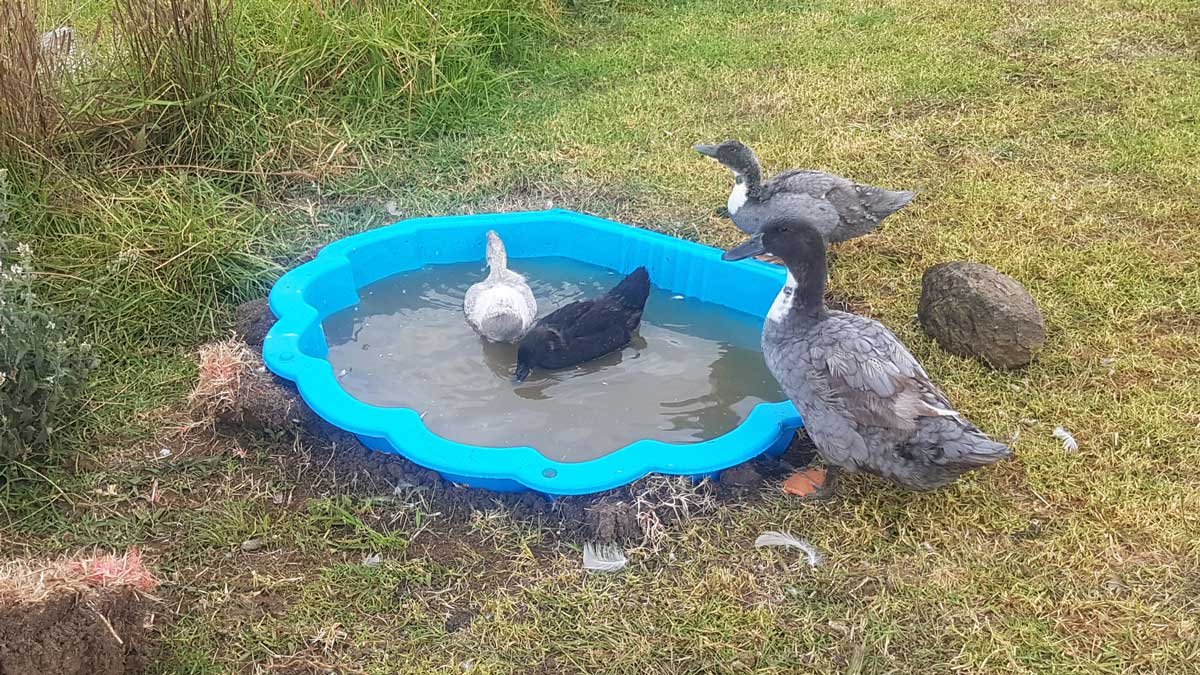It strikes me today that I haven’t really written about our ducks (aside from the miraculous survival story of Hoppy). When we purchased the property, it came with 6 Swedish Blue ducks. Since then, their numbers have swelled to somewhere between 18 and 21. Along with the chickens, they are part of the character of the place.
We have a favourite duck, for sure. His name is Richie McCaw. He’s the one I’m holding in the image up the top. We call him that because he’s all black. Well, except for a few feathers on his chest and an emerald sparkle on his wings. He was part of our first hatching in December, and quite different to all the others. He has black feet and a black bill, while everyone else has mainly orange feet and grey bills. From what I can tell (and I would never declare to be an expert), he seems to be some kind of throwback to a Pomeranian Duck.
Richie McCaw’s mother is ‘Mama’. She earned her highly original name by being the first duck to sit on a nest. Back in August while we were still in the process of moving in, she nested in a patch of cavolo nero in the garden. But we had some high rain events and we think that killed the ducklings she was trying to hatch back then.
It took her 3 tries, but she finally hatched 4 ducklings in December last year. In early January, we lost one in a poultry brawl. Three of that nest have survived, bringing our numbers to 9.
When a mother duck hatches a clutch of eggs, we take her off the nest she’s been sitting on and move the whole family to a nursery we have set up. Back in November, we got our very first duckling. One day it was here, and the next it was gone. We don’t know exactly what happened. It could have been a predator, or a horny drake. But we learned a lesson on keeping them safe, so now they are isolated from the males, and locked away at night from predators.
Last week, we moved a clutch of 5, and on Friday, we pulled 5 chicks and a couple of eggs off their original nest and moved them into the nursery as well. It’ll be a few days before we know exactly how many ducklings we have from that lot.
As cute as these new ducklings are (and they really are the cutest little fuzzbutts), we refer to most of them as ‘the meat ducks’.

We are planning to eat our ducks, and we’re starting to turn our attention to selecting who we’ll keep, and who we won’t. It’s a grim task. I’m not looking forward to learning the process of killing and butchering (though, it must be done). But I am looking forward to learning how to cook duck.
Even though I don’t eat chicken, it turns out I really like duck. But duck meat is expensive and I’ve only ever had it in restaurants. I’ve never been able to afford or justify the kind of prices I’ve seen in grocery stores. Especially for something I don’t know how to cook and may very well screw up spectacularly.
But with possibly a dozen meat ducks growing speedily, this year I’ll likely get my chance to perfect my grandmother’s duck a l’orange. Perhaps invent my own recipe for duck roasted on the Weber BBQ to serve to guests.

The thing is, if we just let them breed and live as a giant flock of ducks, we’d have some health and safety issues. Duck poos are huge – like the size of a small dog’s poo. We were quite confused the first time we found one. I walk around every 2 or 3 days picking up feathers and poo for the compost. 9 teenage and adult ducks make a lot of poo. Much more, and dealing with it would become a very time consuming job.
We can’t really stop them from multiplying either. The males are both persistent and insistent. They’ll have sex wherever and whenever the male can catch the female. Sometimes they run around quacking loudly for 5 minutes before the male finally runs down the female. We’ve seen them have sex in a 10l bucket of water.
While we could take their eggs before they begin sitting on them (I hear they’re great for making sponge cakes), we’d have to be able to find them early enough. At the moment we have trouble finding the nests until they’re sitting on them. They usually choose a gnarly thistle or gorse bush. One of my projects right now is to make them some nesting boxes. The big question is whether they will use them.
So for now, our best population control is to eat them. They have a great free-range life while they’re alive. They have a swimming pool, regular meals and treats, and a field to roam around in. Looking your meal in the eye is something I guess I kind of have to get used to, but that’s also probably a blog for another day.
We really like our ducks. They’re funny, and cute, and they make a great intruder alert system. More than once we’ve shot a possum that the ducks had been making a lot of noise about.
If you happen to be interested in adopting some, please get in touch – we don’t strictly need a dozen meat-ducks so we have ducklings to spare for anyone who wants to take them on. You’ll need to be able to take at least 3. They need space, shelter, food, and somewhere to swim.



Take care we went from 4to 100in 3_4year
Candle eggs and smell i use my phone toech
Never ever eat duck eggs raw.
I can totally see how easy it would be for the population to completely explode! We really will have to cull or adopt them, I don’t think 100 ducks is something I want! I haven’t tried doing anything with the eggs yet though so I appreciate the warning to cook them properly, thanks!